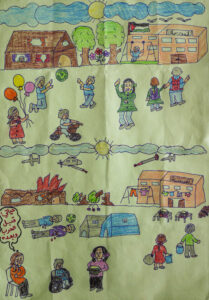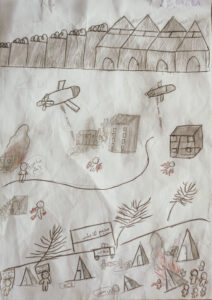Our work is urgently needed because of the dire conditions in the Gaza Strip. Just 26 miles long and a few miles wide, it is home to 2.3 million Palestinians, more than half of them children. Over 70% are refugees who had lived in eight densely-crowded refugee camps and are now largely in tented encampments. Young adults in the Gaza Strip have experienced five major Israeli military offensives – the last which is ongoing – and 18 years of being shut off from the wider world.
The massive physical and psychological injuries experienced by a civilian population with no place to hide, the devastation of land, homes, schools, clinics, infrastructure and the economy, and the ongoing suffocating siege are bound to have a lasting, dramatic impact on Gaza. In the Gaza Strip, individual and collective mental health are closely tied to the human rights abuses endured by Palestinians on a daily basis.
The enduring psychological toll of war, particularly on children, highlights the urgent need for mental health support during and after crises. Joanna Santa Barbara (Medicine and Peace, 2006) (link) emphasizes that alongside rehabilitation, addressing the root causes of war is vital.
Abdel Aziz Thabet and Panos Vostanis’ longitudinal study (link) in Gaza demonstrates that while PTSD reactions can decrease without further stressors, many children continue to suffer from emotional and behavioral challenges, reflecting the long-term impact of cumulative trauma. Similarly, Ahmed Fasfous et al. (link) found high rates of PTSD among Palestinian children in Hebron, reinforcing the need for immediate and sustained psychological intervention.
These findings guide our mission to provide culturally sensitive mental health care and promote healing and resilience in communities affected by conflict.
Reports
https://www.gazamentalhealth.org/reports/
Webinars
https://www.gazamentalhealth.org/webinars/
Videos
https://www.gazamentalhealth.org/videos/

